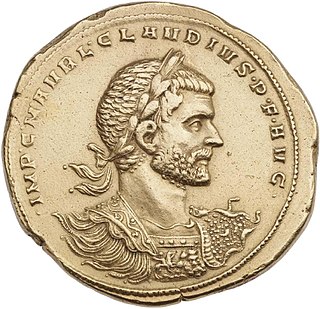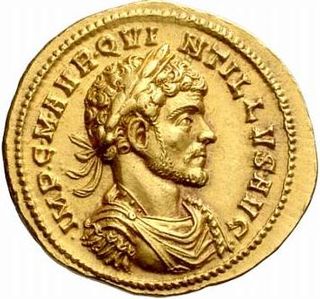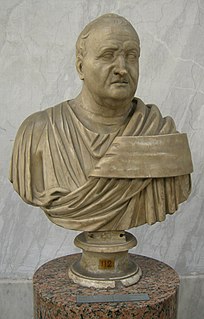Related Research Articles

Julia Agrippina, also referred to as Agrippina the Younger, was a powerful Roman empress and one of the most prominent and effective women in the Julio-Claudian dynasty. Her father was Germanicus, a popular general and one-time heir apparent to the Roman Empire under Tiberius; and her mother was Agrippina the Elder, a granddaughter of the first Roman emperor Augustus. She was the younger sister of emperor Caligula, the niece and fourth wife of emperor Claudius who succeeded Caligula, and the mother of emperor Nero, who succeeded Claudius.

Claudius was Roman emperor from AD 41 to 54. Born to Nero Claudius Drusus and Antonia Minor at Lugdunum in Roman Gaul, where his father was stationed as a military legate, he was the first Roman emperor to be born outside Italy. Nonetheless, Claudius was an Italic of Sabine origins and a member of the Julio-Claudian dynasty. Because he was afflicted with a limp and slight deafness due to sickness at a young age, his family ostracized him and excluded him from public office until his consulship, shared with his nephew Caligula in 37.

Caligula, formally known as Gaius, was the third Roman emperor, ruling from AD 37 to 41. The son of the popular Roman general Germanicus and Augustus's granddaughter Agrippina the Elder, Caligula was born into the first ruling family of the Roman Empire, conventionally known as the Julio-Claudian dynasty. Germanicus's uncle and adoptive father, Tiberius, succeeded Augustus as emperor of Rome in AD 14.

The Julio-Claudian dynasty was the first Roman imperial dynasty, consisting of the first five emperors—Augustus, Tiberius, Caligula, Claudius, and Nero—or the family to which they belonged. They ruled the Roman Empire from its formation under Augustus in 27 BC until AD 68, when the last of the line, Nero, committed suicide. The name "Julio-Claudian dynasty" is a historiographical term derived from the two main branches of the imperial family: the Julii Caesares and Claudii Nerones.

Nero was the fifth Roman emperor, ruling from 54 to 68. His infamous reign is usually associated with tyranny, extravagance and debauchery. Nero, originally named Lucius Domitius Ahenobarbus, belonged to the Julio-Claudian dynasty, and was adopted as heir by the emperor Claudius, his great-uncle and stepfather. Nero succeeded Claudius while not yet aged 17, and his mother, Agrippina, tried to dominate his early life and decisions, but Nero cast her off and had her killed five years into his reign.

Aurelian was Roman emperor from 270 to 275. His reign featured an unprecedented series of military victories which reunited the Roman Empire after it had practically disintegrated under the pressure of barbarian invasions and internal revolts. His successes were instrumental in ending the Crisis of the Third Century, earning him the title Restitutor Orbis – "Restorer of the World".

Marcus Aurelius Claudius 'Gothicus', also known as Claudius II, was Roman emperor from 268 to 270. During his reign he fought successfully against the Alemanni and decisively defeated the Goths at the Battle of Naissus. He died after succumbing to "pestilence", possibly the Plague of Cyprian that had ravaged the provinces of the Empire.

Quintillus was Roman emperor for a few months in 270. He was a brother of Claudius Gothicus.

I, Claudius is a historical novel by English writer Robert Graves, published in 1934. Written in the form of an autobiography of the Roman Emperor Claudius, it tells the history of the Julio-Claudian dynasty and the early years of the Roman Empire, from Julius Caesar's assassination in 44 BC to Caligula's assassination in AD 41. Though the narrative is largely fictionalized, most of the events depicted are drawn from historical accounts of the same time period by the Roman historians Suetonius and Tacitus.

The princeps senatus was the first member by precedence of the Roman Senate. Although officially out of the cursus honorum and possessing no imperium, this office conferred prestige on the senator holding it.

Gnaeus Domitius Ahenobarbus was a close relative of the five Roman Emperors of the Julio-Claudian dynasty. Domitius was the only son of Antonia Major and Lucius Domitius Ahenobarbus. His siblings were Domitia Lepida the Elder and Domitia Lepida the Younger, mother of the empress Valeria Messalina. He was brother-in-law and first cousin once removed of the Emperor Caligula, maternal cousin of the Emperor Claudius and the biological father of the Emperor Nero.
Gaius Julius Callistus was a Greek imperial freedman during the reigns of Roman Emperors Caligula and Claudius. Callistus was originally a freedman of Caligula, and was given great authority during his reign, which he used to amass even greater wealth. He often advised Caligula on imperial policy and how to deal with emergent issues such as the abundant conspiracies against the emperor. He used his influence to help his friends, including Domitius Afer, whose treason case was dropped at Callistus' behest. However, Callistus was not immune from Caligula's wrath, and when a thwarted assassin named Callistus as a fellow conspirator in the failed plot, Caligula was ready to believe him. It was only pleading that saved Callistus' life.

Lucius Vitellius Veteris or the Elder was the youngest of four sons of procurator Publius Vitellius and the only one who did not die through politics. He was consul three times, which was unusual during the Roman empire for someone who was not a member of the Imperial family. The first time was in the year 34 as the colleague of Paullus Fabius Persicus; the second was in 43 as the colleague of the emperor Claudius; the third was in 47 again as the colleague of the emperor Claudius.

The Claudian letters were developed by, and named after, the Roman Emperor Claudius. He introduced three new letters to the Latin alphabet:

De vita Caesarum, commonly known as The Twelve Caesars, is a set of twelve biographies of Julius Caesar and the first 11 emperors of the Roman Empire written by Gaius Suetonius Tranquillus.

A Body in the Bath House is a 2001 historical mystery crime novel by Lindsey Davis and the 13th book of the Marcus Didius Falco Mysteries series. Set in Rome and Britannia in AD 75, the novel stars Marcus Didius Falco, informer and imperial agent. The title refers to the discovery of a corpse hidden beneath the floor of one bath house and a murder which takes place in another. American editions spell "bathhouse" in the title as one word.

Tiberius Julius Cotys I Philocaesar Philoromaios Eusebes, also known as Cotys I or Kotys I was a prince and Roman client king of the Bosporan Kingdom.
Marcus Arrecinus Clemens was a prefect of the Roman imperial bodyguard, known as the Praetorian Guard.
Publius Suillius Rufus was a Roman senator who was active during the Principate. He was notorious for his prosecutions during the reign of Claudius; and he was the husband of the step-daughter of Ovid. Rufus was suffect consul in the nundinium of November-December 41 as the colleague of Quintus Ostorius Scapula.
References
- ↑ Paul Gallivan, "The Fasti for the Reign of Claudius", Classical Quarterly , 28 (1978), pp. 408, 424
- ↑ Tacitus, Annales , XIII.43
| Political offices | ||
|---|---|---|
| Preceded by Gaius Cestius Gallus as Suffect consul | Suffect consul of the Roman Empire 42 with Gaius Caecina Largus | Succeeded by Tiberius Claudius Caesar Augustus Germanicus III, and Lucius Vitellius II as Ordinary consuls |
| This article about an Ancient Roman politician is a stub. You can help Wikipedia by expanding it. |